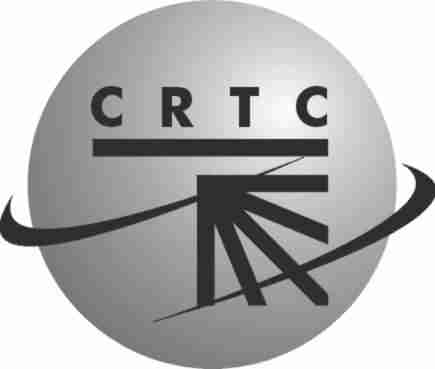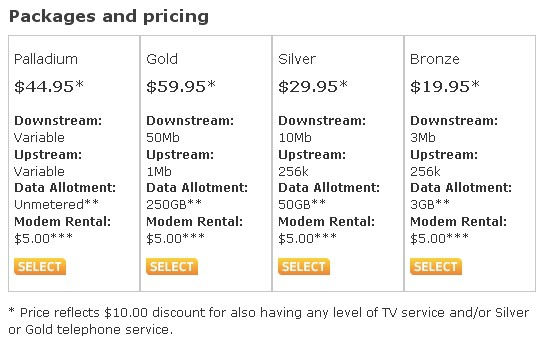
The Canadian Radio-television and Telecommunications Commission
Thanks to quick work from the Canadian Radio-television and Telecommunications Commission (CRTC), Canadian broadband providers have wasted no time announcing new usage limits and penalties for those who exceed them.
The principal culprit for the Internet Overcharging: Bell (Canada), the nation’s largest telecommunications company.
Bell’s newly won right to charge wholesale customers usage-based billing rates has caused a collective groan from independent providers from Vancouver to Charlottetown. Primus, the second-largest alternative communications company in Canada, threw up its hands and announced it was going to pass Bell’s costs along to their customers. Some other providers have already raised rates, shocking customers who received December bills with $100 in overlimit penalties.
“It’s an economic disincentive for Internet use,” said Matt Stein, vice-president of network services for Primus. “It’s not meant to recover costs. In fact these charges that Bell has levied are many, many, many times what it costs to actually deliver it.”
That is a hallmark example of what happens under Internet Overcharging schemes like “usage-based pricing,” usage caps, or other limited use plans. Customers don’t pay for their actual broadband use — they overpay, especially when stiff penalties are imposed when they exceed their usage allowance.
 “Canada’s broadband market is a racket, period,” says our reader Andy, who lives near Petawawa, in northern Ontario. “If you are in a major city in the south, you can choose Bell or one of their lackeys or the cable company, which almost always means Shaw or Rogers in English-speaking Canada.”
“Canada’s broadband market is a racket, period,” says our reader Andy, who lives near Petawawa, in northern Ontario. “If you are in a major city in the south, you can choose Bell or one of their lackeys or the cable company, which almost always means Shaw or Rogers in English-speaking Canada.”
Andy doesn’t have access to cable, so his broadband comes courtesy of DSL from the phone company. He counts himself lucky he has that, even though it only delivers around 512kbps and is down at least once a week, especially when the weather is bad. Other communities have no broadband at all, and some areas are so desperate for access, they have provided financial incentives to attract a provider to town. It rarely succeeds. Zeropaid reports a handful on unscrupulous would-be providers have taken the incentives and left town with no broadband service to show for it.
“These guys only want the easy customers and they’ve got them in Toronto or Ottawa,” Andy says. “The rest of us can live with dial-up.”
The Canadian government occasionally launches highly publicized demonstration projects to deliver rural broadband in northern Canada, often over wireless, something Andy scoffs at.
“When the TV cameras are shut off and [Prime Minister] Stephen Harper’s political bandwagon goes home, the networks last for about a month until something goes wrong and the whole thing shuts down, sometimes for weeks before someone repairs it,” Andy says.
There oughta be a law.

Katz
In fact Canada, a country with a reputation for keeping a regulatory eye on essential services, has an agency that is supposed to protect consumers and monitor telecommunications services. Unfortunately for Canadians, it was that agency that gave Bell the go-ahead to kill unlimited, flat rate broadband — the service that has kept most independent service providers in business.
Critics charge the Commission has been acting more like a Big Telecom industry trade group than an independent oversight body, and many independent providers openly wonder how long they’ll survive with Bell’s predatory pricing.
Reviewing who serves on the Commission may provide some answers about why they seem to be closely aligned with Canada’s largest telecom companies. Many of the commissioners used to work for the very companies they are now asked to regulate, and some are likely to return to them after their stint at the CRTC. The agency’s supposedly independent commissioners know if they want future employment in the telecommunications industry, it’s best not to antagonize your next boss.
Take Commissioner Leonard Katz. He joined the CRTC in 2005 and was appointed vice chairman of telecommunications in 2007. For 30 years before joining the Commission, Katz was employed by Canada’s largest telecom firm, moving up through Bell’s management ranks from 1974-1985. His last big job at Bell was as the assistant director of Bell’s regulatory lobbying department, where he spent his energy and time dealing with federal politicians and the CRTC. Katz also loves Canada’s wireless industry, dominated by Rogers Communications. He was founder and chairman of the Cellular Telecommunications Industry Association Clearinghouse for wireless carriers.

Arpin
Or there was Michel Arpin, a consummate former insider at some of Canada’s largest corporately-owned broadcast station groups like Astral Broadcasting, Mutual Broadcasting, and Radiomutuel. He also had a side relationship with Telus, a western Canadian telecom company that also belongs to the Canadian Association of Broadcasters (CAB). Arpin served CAB as vice-chair and chair. Arpin, the corporate media man, also served as the vice-chairman of the CRTC’s broadcast division until late last year.
Other examples:
- Rita Cugini — A regional commissioner for the province of Ontario, her professional background has been working for some of the province’s biggest media interests, including Alliance Atlantis, Telelatino, and CFMT/OMNI. She also is integrally involved with the Canadian Association of Broadcasters, which bends the ears of regulators regularly on a variety of matters;
- Tim Denton — About as close to the broadband industry as you can get, Denton’s role as a commissioner began in 2008, but his money was made working for the broadband industry, including the Canadian Association of Internet Providers, which lobbies for big broadband provider interests.
- Candice Molnar — Serves today as regional commissioner for Manitoba and Saskatchewan, but she knows most of the prairie provinces’ movers and shakers by name, having spent more than 20 years at SaskTel, Saskatchewan’s biggest phone company. She helped guide SaskTel from provincial to federal regulation when she worked there and her voting record shows her heart is still with her former employer.

Cugini
With a Commission stacked against ordinary Canadian consumers, it’s no wonder Internet Overcharging schemes and stifled broadband competition rule the day in Canada.
“Rural Canada always pays the biggest price,” says Andy. “If it didn’t happen in Toronto or Ottawa, it didn’t happen at all.”
Andy complains Canadian broadband will never improve with Internet Overcharging schemes in place.
“They complain about your usage and say if they can restrict it, they can improve service to more people; well, where is my better service?” Andy asks.
“At least I don’t have to worry about their usage allowances… yet,” Andy says. “Even if I left my connection running continuously, at these speeds I doubt I could do much damage.”
![]() Nobody has successfully monetized the broadband experience like Canadian ISPs have. Even as their costs to deliver the service continue to rocket downwards, companies keep on increasing prices, exposing Canadian consumers to unwarranted bill shock from unjustified overlimit fees. What does it cost Shaw per gigabyte? An estimated 1-3 cents. What do they charge you? Up to $2.
Nobody has successfully monetized the broadband experience like Canadian ISPs have. Even as their costs to deliver the service continue to rocket downwards, companies keep on increasing prices, exposing Canadian consumers to unwarranted bill shock from unjustified overlimit fees. What does it cost Shaw per gigabyte? An estimated 1-3 cents. What do they charge you? Up to $2.

 Subscribe
Subscribe











